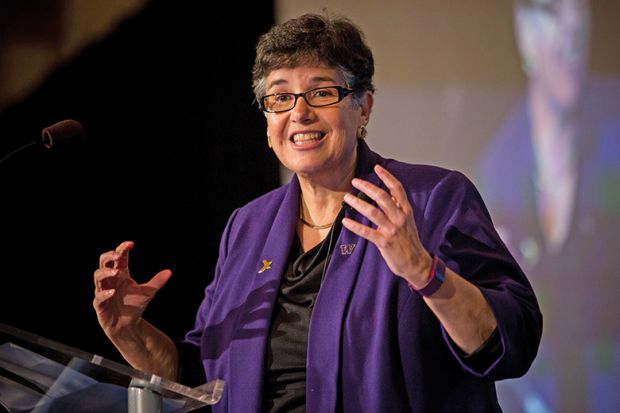Baker College of Muskegon issued the following announcement on Dec. 14
A US university president has warned sector leaders against allowing the college admissions scandal to pass without addressing dubious yet legal forms of donor influence.
Ana Mari Cauce, president of the University of Washington, noted that it remained fully permissible for wealthy families to boost their children’s chances of admission to an institution simply by making a large financial donation.
“In both cases,” she told Times Higher Education, referring to the admissions scandal, “you have money talking in a manner that’s extremely direct and that flies in the face of the values of admission processes.”
The admissions scandal, which became public in March, involved some 50 parents, coaches and other college officials who allegedly helped applicants gain entry to elite universities through bribe-fuelled ruses that mostly involved false claims that a student was an athletic recruit. Many of those involved have pleaded guilty and have been sentenced to prison terms of several months.
But as the lead prosecutor pointed out at the time, those parents could well have accomplished much the same for their children without risking public scorn and the inside of a jail cell.
That reality of donor benefits had been highlighted just a few months earlier at the trial where Harvard University was accused – and later acquitted – of unfairly discriminating against Asian American applicants. Data in that case demonstrated the admissions advantages enjoyed by donor families.
Overall, US universities have been sparing in describing any policy changes prompted by the admissions scandal. Among the few reported responses, the University of Virginia said it would prohibit the acceptance of gifts from the families of athletes during recruitment and application processes. Arizona State University has done something similar. Despite some loud initial complaining, federal lawmakers have taken no action, with the strong backing of US higher education lobbyists.
While public universities typically do not offer admissions advantages to the children of donors, Professor Cauce said that Washington was considering options that include a ban on donations from parents of students for at least the first year after their admission.
Donor influence in admissions at US colleges is often exercised through policies that grant the institution’s leadership some authority to accept a certain number of applicants outside normal processes, said Mark Becker, the president of Georgia State University.
Such “special admits” were not necessarily a bad idea because presidents could responsibly use that authority to invite candidates with unusual talents, such as those involved in the performing arts, Professor Becker said.
The best way to avoid abuses in the use of such discretionary power was clarity and openness, he said.
“One reasonable thing is just to actually be honest about it and say, ‘Look, there’s going to be a limited number of special admits on an institutional priority basis,’” Professor Becker said. “Just be straight and honest about it, because we make exceptions for a variety of reasons.”
Original source can be found here.

Source:Baker College of Muskegon


 Alerts Sign-up
Alerts Sign-up